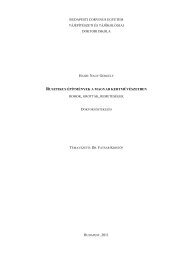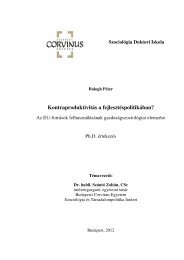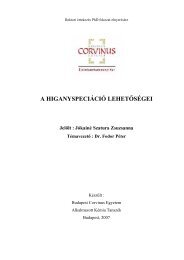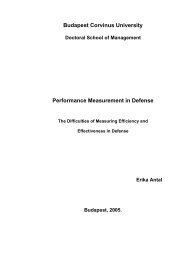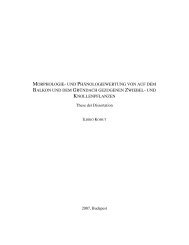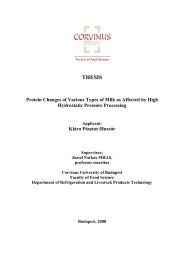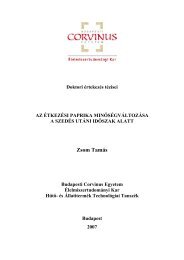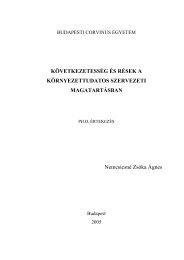értekezés - Budapesti Corvinus Egyetem
értekezés - Budapesti Corvinus Egyetem
értekezés - Budapesti Corvinus Egyetem
Create successful ePaper yourself
Turn your PDF publications into a flip-book with our unique Google optimized e-Paper software.
5. függelék - A vezetői kompenzációval kapcsolatos empirikus eredmények<br />
Schrand/Unal [1998], Haushalter [1997, 2000], Tufano [1996], Gay/Nam [1998] find a<br />
negative relationship between the extent of hedging and stock options held by managers.<br />
However, Haushalter [2000] points at a difficulty in drawing strong conclusions about the<br />
effects of options holdings on hedging. Since he is unable to calculate the delta and vega of<br />
managers’ exercisable stock options, and as Guay [1999] argues that these sensitivities<br />
determine the effect stock options have on the convexity of the relation between the<br />
manager’s wealth and firm value 170 , the presence of stock options do not directly lead to<br />
convex utility functions. As such, empirical results can not reliably back or oppose the<br />
assumptions of theory.<br />
In addition, Haushalter [2000] provides some evidence that the likelihood that a company<br />
hedges is negatively correlated with the fraction of shares owned by managers, opposite to<br />
that predicted by theory. This negative correlation may be attributed to, what he calls,<br />
“self-selection” by the managers. That is, the more positive a manager’s outlook is toward<br />
future market prices, the more likely he is to increase his shareholdings and the less likely<br />
he is to hedge. Agrawal and Manelker [1987], and Hill and Snell [1988] find the same<br />
negative correlation, but they explain it with the fact that increasing managerial ownership<br />
makes their interests more aligned with those of shareholders, which latter may require<br />
intensive risk-taking.<br />
Wright, Ferris, Sarin and Awasthi [1996] observe a non-linear relationship between equity<br />
ownership by managers and corporate risk taking. Their empirical results indicate that a<br />
low degree of equity ownership by the managers of growth companies positively<br />
influences corporate risk taking, but an increasing equity stake tends to reduce risk taking.<br />
For firms without growth prospects, the impact of managers’ equity ownership on<br />
corporate hedging is statistically insignificant.<br />
Some of the papers investigate how the kind of compensation contract chosen by owners<br />
depends on the investment opportunity set available. The inherent thought is that risk-<br />
170 For example, the wealth of a manager whose options holdings are deep in-the-money is not as sensitive to<br />
a change in the underlying risk of a company’s equity as one whose options holdings are slightly out-of-the<br />
money.<br />
171



